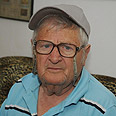
Holocaust survivors: Past still hurts; we need more help
New survey shows 40% of survivors living in Israel believe another Holocaust possible; most not pleased with treatment provided by State. "There are many expenses – rent, food and medication. The money is just not enough,' says 80-year-old Otto Goldman, 'I need more help'
Some 19% of Holocaust survivors living in Israel have skipped at least one meal over the past year due to economic troubles, according to a poll conducted by the Foundation for the Benefit of Holocaust Victims in Israel.
The poll of 500 respondents, published Wednesday ahead of Holocaust Remembrance Day (April 8), indicated that 14% of the survivors were forced to give up medication at least once this past year due to their dire economic situation; 37% of those polled defined their financial situation as 'not good'; 67% said they were not pleased with the treatment provided by the State, and 92% claimed the State was not allocating sufficient funds for their treatment. A staggering 40% of survivors believe another Holocaust is possible, the survey showed.
Related stories:
- Report: 1 in 4 Holocaust survivors suffers poverty
- Prices go up, seniors go under
- This is your future
According to data provided by the foundation, 192,000 Holocaust survivors live in Israel, but 37 pass away every day. According to the report, the survivors' average age is 84 and about a third of them (over 36%) live alone.
About a third of the survivors (some 60,000) have turned to the Foundation for the Benefit of Holocaust Victims this past year to receive assistance. According to the foundation, 89% of the survivors in Israel live on less than NIS 5,000 ($1,370) a month, while 68% live off just NIS 3,000 ($822) a month.
The foundation says the survivors' needs will continue to increase through 2015. In 2016 their situation will improve, and the trend will reverse beginning in 2017.
Holocaust survivor Otto Goldman, 80, said the loneliness is "killing" him. Since his wife died 16 years ago, Goldman has been living alone in a small apartment in Beersheba. "I'm alone for most of the day. There's no one here to help when it hurts," he said, adding that his two children live far away. "They try to help, but they have their own problems."
During World War II, Goldman was a child living in the Jewish ghetto in Budapest, Hungary, where he was born. He was separated from his parents and lived with grandparents. "Everything that happened there still lives with me and pains me every day," he said. Goldman was shot in the leg while trying to smuggle food into the ghetto, and his father was murdered by the Nazis. His mother passed away just months after returning from the Mauthausen concentration camp. "She couldn't survive her experience there," he said.
 |
Goldman is diabetic and suffers from dysfunctional kidneys. He is assisted by a nurse who comes in several times a week for a few hours. "It's not enough; I need more help," said the survivor, who receives NIS 3,900 ($1,069) a month as a stipend from Social Security and the Treasury. "I have a lot of expenses – rent, electricity, food and medicine. The money just isn’t enough," he said. "The State must help us more."
Rony Kalinsky, CEO of the Foundation for the Benefit of Holocaust Victims in Israel, told reporters in Tel Aviv while presenting the report that Israel has a "final, five-year window of opportunity to boost its efforts for the sake of the Holocaust survivors who are still among us."
- Receive Ynetnews updates
directly to your desktop















